Division of South Australia facts for kids
Quick facts for kids South AustraliaAustralian House of Representatives Division |
|
|---|---|
| Created | 1901 |
| Abolished | 1903 |
| Namesake | South Australia |
The Division of South Australia was a special voting area in Australia that covered the entire state of South Australia. It was used for the very first federal election in 1901.
Unlike most other states, South Australia didn't have smaller voting areas. Instead, the whole state was one big "seat" where people voted for seven different members of Parliament at once. This meant each voter could choose up to seven people they wanted to represent them!
This special setup didn't last long. After the 1901 election, the rules changed. By the 1903 election, the Division of South Australia was split into seven smaller, individual voting areas. From then on, each of these new areas would elect just one person to Parliament.
Meet the Members
These are the people who were elected to represent South Australia in the first Australian Parliament. They are listed in the order of how many votes they received.
| Image | Member | Party | What they did | Where they went next | |
|---|---|---|---|---|---|
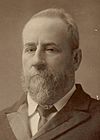 |
Charles Kingston (1850–1908) |
Protectionist | He was a minister in the first Australian government, led by Edmund Barton. | When the South Australia division ended, he moved to represent the new Adelaide area. | |
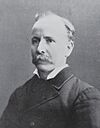 |
Sir Langdon Bonython (1848–1939) |
He was a well-known newspaper owner. | He moved to represent the new Barker area. | ||
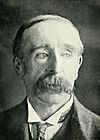 |
Paddy Glynn (1855–1931) |
Free Trade | He had been a member of the South Australian Parliament before. | He moved to represent the new Angas area. | |
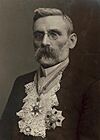 |
Sir Frederick Holder (1850–1909) |
He became the Speaker (the person who runs the meetings) of the House of Representatives. | He moved to represent the new Wakefield area. | ||
| Independent | He started as Free Trade but later became an Independent. | (See above) | |||
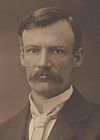 |
Lee Batchelor (1865–1911) |
Labour | He was also a member of the South Australian Parliament before. | He moved to represent the new Boothby area. | |
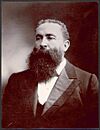 |
Vaiben Louis Solomon (1853–1908) |
Free Trade | He had represented the Northern Territory in the South Australian Parliament. | He tried to win the new Boothby area but didn't succeed. He later went back to the South Australian Parliament. | |
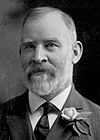 |
Alexander Poynton (1853–1935) |
He had also been a member of the South Australian Parliament. | He moved to represent the new Grey area. | ||
The Change to Smaller Voting Areas
After the 1901 election, the Division of South Australia was divided into seven smaller voting areas, called "single-member seats." This meant that from the 1903 election onwards, each of these new areas would elect only one person to Parliament.
The new areas and the politicians who represented them were:
- Adelaide (represented by Charles Kingston, Protectionist)
- Angas (represented by Paddy Glynn, Free Trade)
- Barker (represented by Sir Langdon Bonython, Protectionist)
- Boothby (represented by Lee Batchelor, Labour)
- Grey (represented by Alexander Poynton, Labour)
- Hindmarsh (represented by James Hutchison, Labour)
- Wakefield (represented by Sir Frederick Holder, Independent)
 | Tommie Smith |
 | Simone Manuel |
 | Shani Davis |
 | Simone Biles |
 | Alice Coachman |

